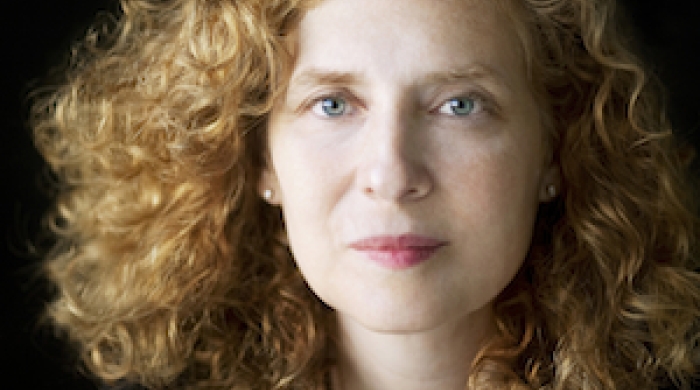This spring, MacArthur Fellow and Pulitzer-winner Julia Wolfe, professor and artistic director of Music Composition at NYU Steinhardt, completed her residency – titled “Unsung Histories” – at Carnegie Hall.
Wolfe served as the Richard and Barbara Debs Composer’s Chair for the 2021-2022 season at Carnegie Hall, which began with virtual events due to ongoing COVID-19 safety restrictions.
“The first event, held in the fall of 2021, was a very special project to me,” says Wolfe. “We created a beautiful film of twelve flutists performing a piece that I wrote during the pandemic lockdown called Oxygen. It was so enriching after so much isolation to be with artists from all over the country.”
The rapid-fire piece, which was commissioned by the National Flute Association, was performed live on August 12 by 144 flutists from the National Flute Society in the Hilton Downtown Chicago.
While Oxygen is a new piece, Wolfe has also performed some of her self-described “warhorses,” which are often themed around political undertones and the way in which people treat others.
“When I began college, I thought I was going to study something connected to social issues or politics,” remembers Wolfe. “I wandered over into a music class during the second semester of my sophomore year, and the pieces I create often feature a confluence of these two worlds.”
Steel Hammer, which is based on the many iterations of the legend of John Henry, was Wolfe’s first live performance at Carnegie Hall after COVID. This contemporary American folk music piece featured banjo, body percussion, and other folk instruments, as well as three female vocalists who filmed their parts from an old factory in Trenton, New Jersey.
While not a part of her residency, Wolfe’s Fire in My Mouth is another stalwart in her repertoire and a further example of her social commentary through composition. This choral piece, which was commissioned by the New York Philharmonic in 2019, tells the story of the tragic Triangle Shirtwaist Factory fire of 1911 in Greenwich Village, in which 146 garment workers died.
The factory occurred in what is now known as the Brown Building at 23-29 Washington Place – practically across the street from NYU Steinhardt.
“During the concert at the New York Philharmonic, we had 146 women singing: thirty-six adults and the rest from the Young People’s Choir of New York,” says Wolfe. “Many of the workers who died were children as young as fourteen, and I wanted to have those voices represented.”
From String Ensembles to Steel Pan Performances
Other “Unsung Histories” presentations included Wolfe’s Cruel Sister, an instrumental string piece that follows the arc of an old Scottish ballad about jealousy and murder, and her Pulitzer Prize-winning Anthracite Fields, which is based on oral histories and interviews of Pennsylvania coal miners.
Wolfe also curated Ensemble Connect’s Up Close concert, which included commissions for composer Robert Honstein, program manager of Steinhardt’s Concert Composition, and Shelley Washington, adjunct faculty in Music Composition and alum of Steinhardt’s Master of Music in Theory and Composition (MM). The concert also featured the premiere of works by two Steinhardt undergraduate Composition alumni, Kyle Brenn (BM ’20) and Amanda Berlind (BM ’20).
It’s so exciting to have a platform like Carnegie Hall for my work, but it’s even more rewarding to share it. For some of the musicians and artists I worked with this year, it was their Carnegie Hall debut. There has been a very supportive, artist-friendly, incredible dialogue throughout my entire residency.
“It’s so exciting to have a platform like Carnegie Hall for my work, but it’s even more rewarding to share it,” says Wolfe. “For some of the musicians and artists I worked with this year, it was their Carnegie Hall debut. There has been a very supportive, artist-friendly, incredible dialogue throughout my entire residency.”
To that end, Wolfe rounded out her residency in May by curating a free Carnegie Hall Citywide concert in Bryant Park, which included innovative composers and artists such as new-music marching band Asphalt Orchestra; steel pan ensemble Pan in Motion; Steinhardt’s Leila Adu-Gilmore, assistant professor of music technology; and a commission for NYU alum and adjunct faculty in Music, Kendall Williams (MM ’13).
Also in 2022, Wolfe was awarded the top graduate alumni award, the James Madison Medal, from her alma mater, Princeton University. Wolfe is only the second composer to receive the Madison Medal in the award’s 40-year history.
Wolfe’s latest work, Her Story for orchestra and women’s voices, will premiere with the Nashville Symphony on September 15-17, followed by performances by the Chicago, Boston, San Francisco, and National symphonies.
Related Articles
Julia Wolfe Begins Artist Residency at Carnegie Hall
Award-winning composer Julia Wolfe has been appointed the Debs Chair composer-in-residence at Carnegie Hall. Wolfe is the recipient of a MacArthur Fellowship and Pulitzer Prize for work that harnesses issues of social justice and labor history.

